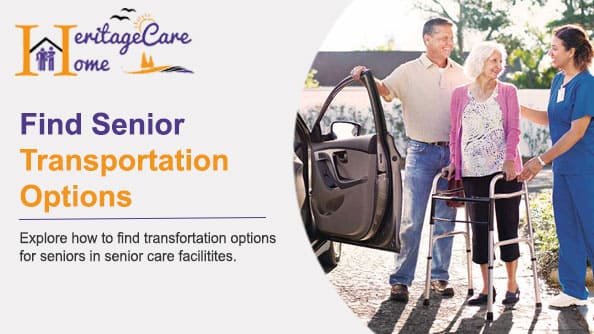Ways to tackle senior loneliness and isolation
- Admin |
- July 17, 2023
We can all relate to how lonely might feel. Since we can't share our pleasant moments with others, it makes the world a little bit grayer and duller...
Read more
As soon as a young adult reaches the legal driving age, getting in the automobile symbolizes independence and freedom. For a senior who has been driving for a long time, the same is true. However, as we age, safety starts to matter.


As soon as a young adult reaches the legal driving age, getting in the automobile symbolizes independence and freedom. For a senior who has been driving for a long time, the same is true. However, as we age, safety starts to matter.
Some elderly people still drive, even when they don't feel very secure doing so. To avoid requesting transport from a friend or relative to the doctor, the grocery store, or other important appointments. The secret may lie in compiling a list of reputable, inexpensive transportation choices.
While some volunteer-based organizations have taken precautions against the coronavirus, many have been negatively impacted. It's crucial to inquire about each possible provider's COVID-19 procedures as you start your search.
Start your local search at the senior center in your neighborhood or the area agency on aging. They could be aware of alternate choices if they don't provide transport or have stopped doing so because of the COVID-19 epidemic. Visit the Senior Centre Directory or the National Association of Area Agencies on Ageing to do an online search if you need assistance identifying these organizations.
Check to discover if the provider's network provides any services if a senior requires transportation to and from doctor's visits. Some medical organizations, hospitals, and rehabilitation facilities are part of larger health systems that provide free transportation in privately owned vehicles.
The National Centre for Mobility Management is a further source of research for volunteer transport programs. They keep a database of senior transport services provided by volunteers. To find programs close to the house of your loved one, search their website.
Although it may seem scary to seniors who have never used it, some local governments offer travel options for those who have mobility issues and other limitations. To learn what is available, contact the mayor's office or the township supervisor.
Moving to a senior living facility could be another option to take into consideration when it comes time for a family elder to give up driving. Many places have transit services. Residents can organize transportation from and to social events and important appointments with the help of the transport crew.
Although many people associate ridesharing services with young persons or out-of-towners, elders also use them. Some ridesharing businesses, like Lyft, are making a concerted effort to draw in older customers. If your elderly loved one prefers not to reserve transport via a mobile app. Seniors can call them whenever they need assistance setting up transport. The article "Are Ride Share Services a Transportation Option for Seniors?" is a great resource for further information.
Residents can utilize transportation services at Heritage Care Home homes for errands, appointments, and visits to nearby locations like restaurants and shopping malls. For additional information about resident transportation, contact the Heritage Care Home Senior Living that is closest to you.

We can all relate to how lonely might feel. Since we can't share our pleasant moments with others, it makes the world a little bit grayer and duller...
Read more
Every year, a large portion of us, regardless of age, make the same New Year's resolution: to be more...
Read more
Travel requirements and preferences can change significantly as we age, regardless of whether you are a seasoned globetrotter or....
Read more
A significant portion of the elderly population in the United States suffers from memory-related issues such as Alzheimer's or Dementia...
Read more
The majority of Americans eagerly look forward to retirement. Many people have distinct memories of traveling, exploring the nation...
Read moreFEEL THE PLEASURE OF BEING CAREFREE